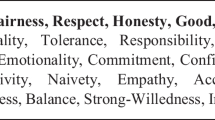Abstract
This chapter explores the interplay of ethics through the lens of power, and from the perspectives of principals. Quandaries emerging as ethics are woven into decisions, and decision-making processes reveal tensions in the co-existence of genuine concern for students’ academic success and well-being, as well as conflicts, contradictions, and dis/ingenuousness among principals. Questions for reflection are included in the hope that they will lead to self-realization and evaluation, and the adoption of strong ethical guiding principles for actions that are in the best interests of children, teachers, and their communities.
Access this chapter
Tax calculation will be finalised at checkout
Purchases are for personal use only
Similar content being viewed by others
References
Blasé, J., & Blasé, J. (2003). Breaking the silence: Overcoming the problem of principal mistreatment of teachers. Thousand Oaks: Corwin Press.
Bogotch, I. E. (2000). Educational leadership and social justice: Theory into practice. ERIC Document Reproduction Services No. ED 452 585.
Costa, A. L., & Kallick, B. (2008). Learning and leading with habits of mind: 16 essential characteristics for success. Alexandria: ASCD.
Duffy, F. M. (2005). Dynamic leadership for systematic change in school districts. The F. M. Duffy Reports, 10(1), 1–7.
English, F. W. (2008). Anatomy of professional practice: Promising research perspectives on educational leadership. Lanham: Rowman & Littlefield Education.
Etzioni, A. (1991). A responsive society. San Francisco: Jossey-Bass.
Firestone, W. A., & Shipps, D. (2005). How do leaders interpret conflicting accountabilities to improve student learning. In W. A. Firestone & C. Riehl (Eds.), A new agenda for research in educational leadership (pp. 81–100). New York: Teachers College Press.
Follett, M. P. (1925). Power. In H. C. Metcalf & L. Urwick (Eds.), Dynamic administration: The collected papers of Mary Parker Follett (pp. 95–115). New York: Harper & Brothers.
Follett, M. P. (1927). The psychology of control. In H. C. Metcalf & L. Urwick (Eds.), Dynamic administration: The collected papers of Mary Parker Follett (pp. 183–209). New York: Harper & Brothers.
Fowler, C. F. (2013). Policy studies for educational leaders: An introduction. New York: Pearson.
Furman, G. C., & Shields, C. M. (2005). How can educational leaders promote and support social justice and democratic community in schools? In W. A. Firestone & C. Riehl (Eds.), A new agenda for research in educational leadership (pp. 119–137). New York: Teachers College Press.
Hallinger, P., & Heck, R. H. (2010). Collaborative leadership and school improvement: Understanding the impact on school capacity and student learning. School Leadership and Management, 30(2), 95–110.
Interstate School Leadership Licensure Consortium. (2008). Educational leadership policy standards: ISLLC 2008. Retrieved from the Council of Chief State School Officers website: Johnstone, C. J., Dikkers, A. M., & Luedeke, A. (2009). Educational leadership in the era of accountability. Educational Considerations, XXXVI(2), 14–18.
Lopez, G. (2006). Diversity. In F. English (Ed.), Encyclopedia of educational leadership and administration (pp. 297–300). Thousand Oaks: SAGE.
Mann, M. (1986). Sources of social power volume 1: A history of power from the beginning to A.D. 1760. Cambridge, UK: Cambridge University Press.
Marshall, C., & Gerstl-Pepin, C. (2005). Re-framing educational politics for social justice. Boston: Pearson.
Metz, M. H. (1978). Classrooms and corridors: The crisis of authority in desegregated secondary schools. Berkley: University of California Press.
National Policy Board for Educational Administration. (2011). Educational leadership program recognition standards: Building level. Retrieved from http://www.ncate.org/LinkClick.aspx?fileticket=tFmaPVlwMMo%3D&tabid=676
National Policy Board for Educational Administration. (2015). Professional standards for educational leaders 2015. Reston: Author.
Nelson, L. N., Palonsky, S. B., & Carlson, K. (2000). Classical issues in education (4th ed.). San Francisco: McGraw Hill.
Patton, M. Q. (2008). Utilization-focused evaluation (4th ed.). Thousand Oaks: Sage.
Shapiro, S. P. (1987). The social control of impersonal trust. American Journal of Sociology, 93(3), 623–658.
Spillane, J. P. (2006). Distributed leadership. San Francisco: Jossey-Bass.
Spillane, J. P., & Orlina, E. (2005). Investigating leadership practice: Exploring the entailments of taking a distributed perspective. Leadership and Policy in Schools, 4(3), 157–176.
Stefkovich, J., & Begley, P. T. (2007). Ethical school leadership: Defining the best interests of students. Educational Management Administration Leadership, 35, 205–224.
Strike, K. A. (1999). Can schools be communities? The tension between shared values and inclusion. Educational Administration Quarterly, 35(1), 46–70.
Strike, K. A. (2007). Ethical leadership in schools: Creating community in an environment of accountability. Thousand Oaks: Corwin Press.
Wasonga, T. A. (2009). Leadership practices for social justice, democratic community, and learning. Journal of School Leadership, 19(2), 200–224.
Wasonga, T. A. (2014). Social control for democratic community. Journal of School Leadership, 24(6), 1155–1176.
Wheatley, M. (2000). Good-bye, command and control. In The Jossey-Bass reader on educational leadership (pp. 339–347). San Francisco: Jossey-Bass.
Young, M. (2012). ELCC district-level standard 5. In M. D. Young & H. Mawhinney (Eds.), The research base supporting the ELCC standards: Grounding leadership preparation & the educational leadership constituent council standards in empirical research (pp. 63–67). Charlottesville: University Council for Educational Administration.
Yukl, G. (1998). Leadership in organizations (4th ed.). Upper Saddle River: Prentice Hall.
Author information
Authors and Affiliations
Editor information
Editors and Affiliations
Rights and permissions
Copyright information
© 2018 The Author(s)
About this chapter
Cite this chapter
Wasonga, T. (2018). Ethics: Acting Ethically to Promote Each Student’s Academic Success and Well-Being. In: Touchton, D., Rodríguez, M., Ivory, G., Acker-Hocevar, M. (eds) Quandaries of School Leadership. Palgrave Macmillan, Cham. https://doi.org/10.1007/978-3-319-59120-9_5
Download citation
DOI: https://doi.org/10.1007/978-3-319-59120-9_5
Published:
Publisher Name: Palgrave Macmillan, Cham
Print ISBN: 978-3-319-59119-3
Online ISBN: 978-3-319-59120-9
eBook Packages: EducationEducation (R0)




